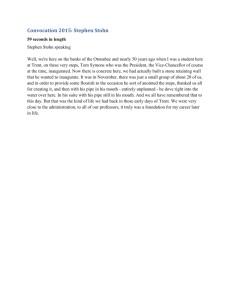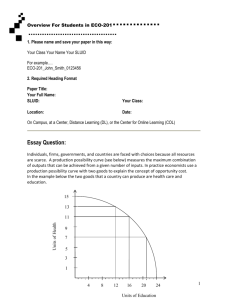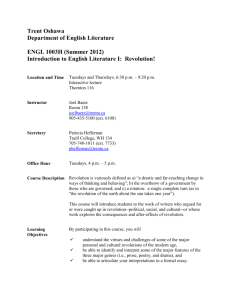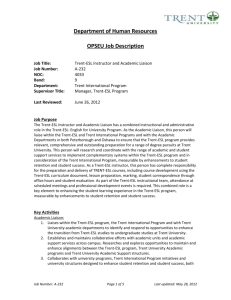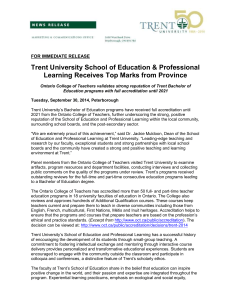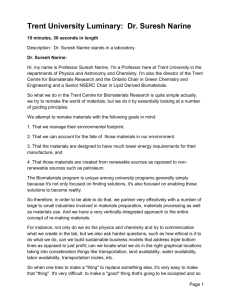Even before Canada was officially recognized as a
advertisement
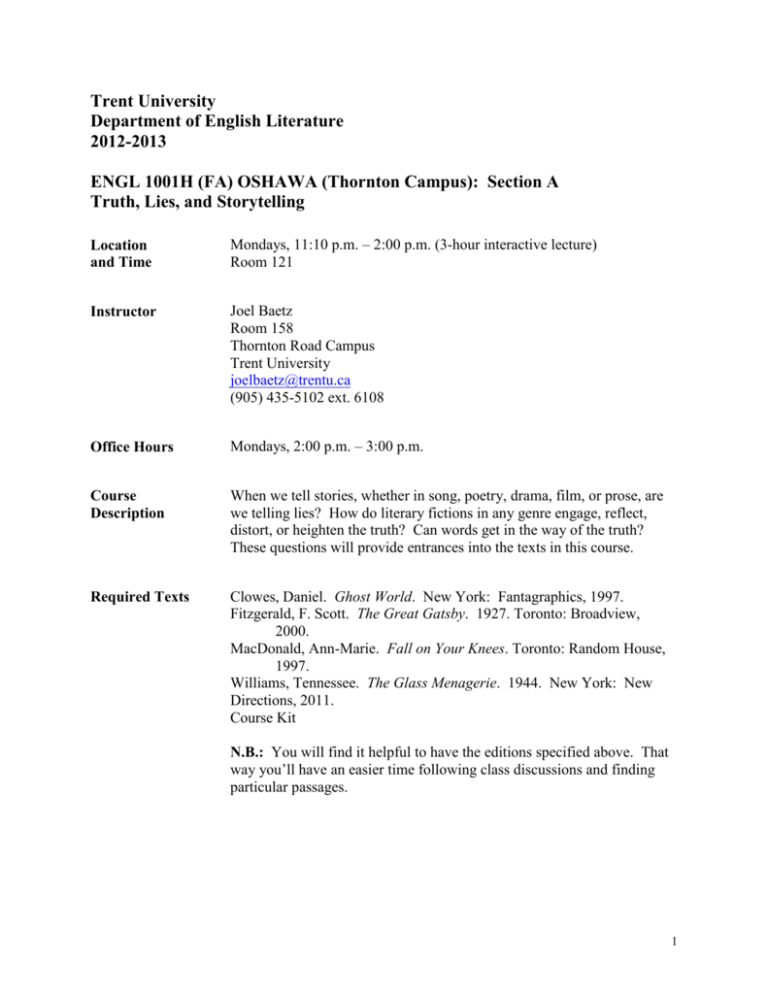
Trent University Department of English Literature 2012-2013 ENGL 1001H (FA) OSHAWA (Thornton Campus): Section A Truth, Lies, and Storytelling Location and Time Mondays, 11:10 p.m. – 2:00 p.m. (3-hour interactive lecture) Room 121 Instructor Joel Baetz Room 158 Thornton Road Campus Trent University joelbaetz@trentu.ca (905) 435-5102 ext. 6108 Office Hours Mondays, 2:00 p.m. – 3:00 p.m. Course Description When we tell stories, whether in song, poetry, drama, film, or prose, are we telling lies? How do literary fictions in any genre engage, reflect, distort, or heighten the truth? Can words get in the way of the truth? These questions will provide entrances into the texts in this course. Required Texts Clowes, Daniel. Ghost World. New York: Fantagraphics, 1997. Fitzgerald, F. Scott. The Great Gatsby. 1927. Toronto: Broadview, 2000. MacDonald, Ann-Marie. Fall on Your Knees. Toronto: Random House, 1997. Williams, Tennessee. The Glass Menagerie. 1944. New York: New Directions, 2011. Course Kit N.B.: You will find it helpful to have the editions specified above. That way you’ll have an easier time following class discussions and finding particular passages. 1 Learning Objectives By participating in this course, you will Assignments and Tests understand the complex relationships between truth, lies, and storytelling (i.e., some truths cannot be told, some lies are better than some truths, and so on), understand what each particular poem, play, graphic novel, short story, or novel says about truth, lies, and storytelling, be able to identify and interpret some of the major features of the three major genres (i.e., prose, poetry, and drama), and be able to articulate your interpretations in a formal essay. Outline for Essay (including thesis statement, topic sentences, and textual evidence): 5% Due October 15 (in class) A Formal or Scholarly Essay (approximately 1000 words): 35% Due November 5 (in class) Close Reading Assignment (two parts: one part on the identification of the particular features of a selected passage, a second part on the analysis of those features): 20% Due November 26 (in class) Final Exam (3 hours; three parts; your understanding of the content and skills from the entire term will be tested): 30% Due T.B.D. Participation (10%) Participation You’ll notice that 10% of your final grade is allotted for your level of participation in class throughout the term. This class runs for three hours and will contain formal lectures, group work, and class discussions; it’s your responsibility to participate in all activities. Please note that this grade will not be for mere attendance. These marks are reserved for the kind and degree of your participation. The best way to participate is to make sure you have read the assigned material before class. Have some questions ready about what you didn’t understand or what you found interesting in the readings, and do some preliminary analysis of the assigned material. 2 Participation means that you Academic Honesty ask questions when you don’t understand, contribute your ideas to classroom discussions, listen to the ideas of others, be open to new ideas and ways of thinking, respond helpfully to others, and help others learn. Trent University is keen to develop independent thinkers and therefore wants to stop students from plagiarising others’ thoughts, arguments, and research. Any good essay will use and respond to work written by other people, but it needs to indicate (properly and carefully) the sources for all the ideas that are not your own. If you have any questions about the documentation of sources or how to develop your own ideas, please speak with me. Academic dishonesty, which includes plagiarism and cheating, is an extremely serious academic offence and carries penalties varying from a 0 grade on an assignment to expulsion from the university. Definitions, penalties, and procedures for dealing with plagiarism and cheating are set out in Trent University’s Academic Integrity Policy. You have a responsibility to educate yourself; unfamiliarity with the policy is not an excuse. You are strongly encouraged to visit Trent’s Academic Integrity website to learn more: www.trentu.ca/academicintegrity. Access to Instruction It is Trent University’s intent to create an inclusive learning environment. If a student has a disability and/or health consideration and feels that he/she may need accommodations to succeed in this course, the student should contact Trent Oshawa’s Disability Services, located in Room 111, through the Trent Oshawa Office at (905) 435-5100. Complete text can be found under Access to Instruction in the Academic Calendar. learningSystem/ Blackboard This course will use learningSystem/Blackboard to post assignment sheets and handouts. Late Penalties All essays are due in class on the date specified. No electronic submissions will be accepted. If an essay is handed in late, it will be docked two grades per week or partial week. So, if an essay is due on Monday but you choose to hand it in on Wednesday, the essay’s grade will drop from A+ to A-, from A to 3 B+, from B+ to B-, and so on. For any of the assigned work or testing opportunities, you may be granted an extension or an alternative testing day if one of two things happens: 1) you have a personal emergency that can be documented (i.e., you have a medical note, police report, or funeral program) or 2) you speak with me two weeks before the assignment is due. Not all extensions requested will be granted, but I will be willing to discuss the possibility. Schedule for Readings Week 1 September 10 Introductions Week 2 September 17 Truth and Truthiness Gladwell, “The Ketchup Conundrum” Doyle, selection from “A Scandal in Bohemia” and “Silver Blaze” Week 3 September 24 When the Facts Aren’t Enough Anonymous, “An Indian Spreads Death” O’Brien, “How to Tell a True War Story” Swift, “A Modest Proposal” Wiebe, “Where Is the Voice Coming From?” Week 4 October 1 The Liars of Literature Agard, “Palm Tree King” Marvell, “To His Coy Mistress” McKay, “Apostrophe” Olds, “Sex Without Love” Shakespeare, “Sonnet 130” Wallace, “The Heroes You Had as a Girl” October 8: THANKSGIVING DAY (No class) Week 5 October 15 Fitzgerald, The Great Gatsby Due: Outline for Essay October 22 – 26: Residential Reading and Laboratory Week: No Classes Week 6 October 29 Williams, The Glass Menagerie 4 Week 7 November 5 The Power of Stories MacDonald, Fall on Your Knees Due: Essay Week 8 November 12 MacDonald, Fall on Your Knees Atwood, “Bluebeard’s Egg” Week 9 November 19 There Is No There There Bartheleme, “The Sentence” Munro, “Miles City, Montana” Stevens, “The Plain Sense of Things” Williams, “This Is Just to Say” Week 10 November 26 Clowes, Ghost World Due: Close Reading Assignment Week 11 December 3 Review 5




